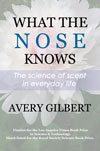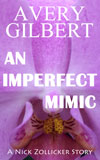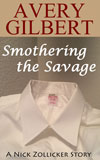
[Steampunk eyewear by Kyle Miller.]
FN reader and fledgling science blogger Cellularscale brought this one to my attention a few days ago. It’s a new paper by a Dutch research team at Utrecht University. Their topic is the Proustian Hypothesis, which holds that odors are more effective triggers of emotional memories than cues in other sense modalities. This frequently invoked notion, along with the crediting of it to the French novelist, is one that I beat to a bloody pulp in a chapter of What the Nose Knows called “Proust’s Soggy Madeleine.”
So when Cellularscale pointed me to “Proust revisited: Odours as triggers of aversive memories,” I downloaded a copy and opened it with interest. Would this group of psychologists be Proust Boosters or Proust Busters?
They begin by noting that previous studies have led to conflicting results regarding olfactory exceptionalism. They also point to a methodological problem: most studies of sensory-cued memories fail to “control for individual differences between memories in terms of content, affective value, and time past since encoding.” In the usual experimental design, you are offered a smell/picture/sound and asked to recall a memory associated with it. So a smoky scent might remind one person of good times at the smokehouse on grandpa’s farm, and another of a traumatic house fire, leading to big-time variability and statistical noise.
One way to reduce this variability is to create a uniform memory in the lab. The Utrecht team did this by having volunteers watch a 12-minute film involving traffic accidents, surgery, and people being crushed by a stampeding elephant. (When it comes to aversive stimuli, psychologists can really deliver the goods!)
The film was accompanied by a scent in the test room, along with background lighting and a soundtrack. All three sensory cues were elaborately pilot tested beforehand to insure that they were equally pleasant, intense and arousing. (The odor was IFF’s Cassifix, dissolved in isopropyl myristate).
Volunteers watched the film and rated it on emotionality, vividness, pleasantness, and arousal. A week later, they came back to the lab expecting to watch another film. Instead, they were asked to write down their memory of the earlier film, and rate the memory on the same dimensions (along with “level of detail” and “evocativeness.”). While doing this they were randomly exposed to one of the three background stimuli from the earlier session: either olfactory, auditory, or visual.
The film-memory ratings were compared across the three groups. Odor-cued memories were less pleasant, more arousing and experienced as more detailed than memories evoked by the music cues. However,
Memories evoked by a visual trigger did not differ significantly from memories evoked by an odour or by music.While odors trumped tunes, they “were not more evocative or emotive than visual triggers.”
So how best to view these results? It depends on whether or not you’re wearing Proust goggles. If you are, then you focus on the hypothesis-saving effectiveness of smell over sound. If not, you see this as more evidence that smell doesn’t live up to its reputation as a super-cue for memory.
The study discussed here is “Proust revisited: Odours as triggers of aversive memories,” by Marieke B.J. Toffolo, Monique A.M. Smeets, and Marcel A. van den Hout, published in Cognition and Emotion, 26:83-92, 2012.




7 comments:
Two weeks ago I got a nasal spray containing xylitol, hoping that it would stop my sinus drainage at night, which it did, but did not get my sense of smell back. Yet, on the way I stepped into a wine shop and was offered a taste of a marvelous port, which I bought, as it reminded me of what my parents drank. My taste is fine. Coincidentally, someone also gave me some Stilton cheese. I have been flooded with memories of the everyday rituals of my family which I am sharing with my sisters. My parents died when I was 20, and my younger sister were too young to remember, or even see and taste what was normal fare in our family when I was young. But I do fear not storing additional memories without smell. It is dangerous having to taste to see if something has gone bad. When you live on food from the church, you get everything once a month, and if you get any vegetables they are already old and have to be cooked right away, so this is an issue for me. I fear not smelling something wrong with the car, or if I am carrying dog feces on my shoes and drawing negative attention to myself.
I speak only from my personal experiences but my guess is that odour memories stay very strong in time. I have experienced this when I was looking for a very particular smell, the smell of my old filmstrip projector from my childhood. Iniially I tried to find the same model of filmstrip which didn't prove to be successful. Then I asked a question about it in a perfume blog. Describing the smell I wrote: "it smells like an urban musk". Only when I found myself in front of a bottle of Tom Ford Urban Musk that I first sampled two years earlier I realized that while I was looking for the smell of the filmstrip projector my memory had already found that this perfume smells exactly like the filmstrip.
I also found these results a little underwhelming. But I thought it was interesting that they at least tried to put it to the test, rather than just using Proust jargon for any old memory study.
NadineisthatU:
Sorry to hear of your smell issues. The anxieties you mention are understandable, but many of the actual risks are manageable.
The fact that you get the flavor of port speaks to good residual smell capacity; the fact that the impairment is associated with sinus problems is also positive for prognosis (compared with head injury, for example). You might consider seeing an ear-nose-and-throat doctor if you haven't already.
MemoryOfScent:
I like your story of the filmstrip projector scent because it's so typically untypical of smell memory: the source is so specific and odd; the tenaciousness of the memory seems out of proportion to the original experience (unless those filmstrips stories were incredibly arousing!), and the present-day triggering links are so haphazard.
That's odor memory in a nutshell: indirect yet profound.
TheCellularScale:
I think the results put odor triggers to memory in just about the right rank. The Proust Boosters overplayed their hand; this paper is a useful corrective to the literature.
I agree that the test method--creating a standardized synthetic memory--was cool. Reminded me of the Philip K. Dick story "We can remember it for you wholesale." It made an amusing movie with Ahhnold and a young Sharon Stone.
http://www.ncbi.nlm.nih.gov/pubmed/20424074
Liljenquist et al., 2010
Here's another one you might be interested in. They start their paper with a quote from Proust, even though their study has nothing to do with memory. Their basic idea is that a clean scent makes people nicer:
"Our findings carry important implications for environmental
regulation of behavior. Considerable evidence explains
how saints become sinners—that is, how people lose their
moral footing—but there is much less understanding of how
sinners can be led toward the path of virtue. By demonstrating
that the association between morality and cleanliness is bidirectional,
our research has identified an unobtrusive way—a
clean scent—to curb exploitation and promote altruism."
Smell: leading sinners to virtue,
The title of your next book?
Post a Comment